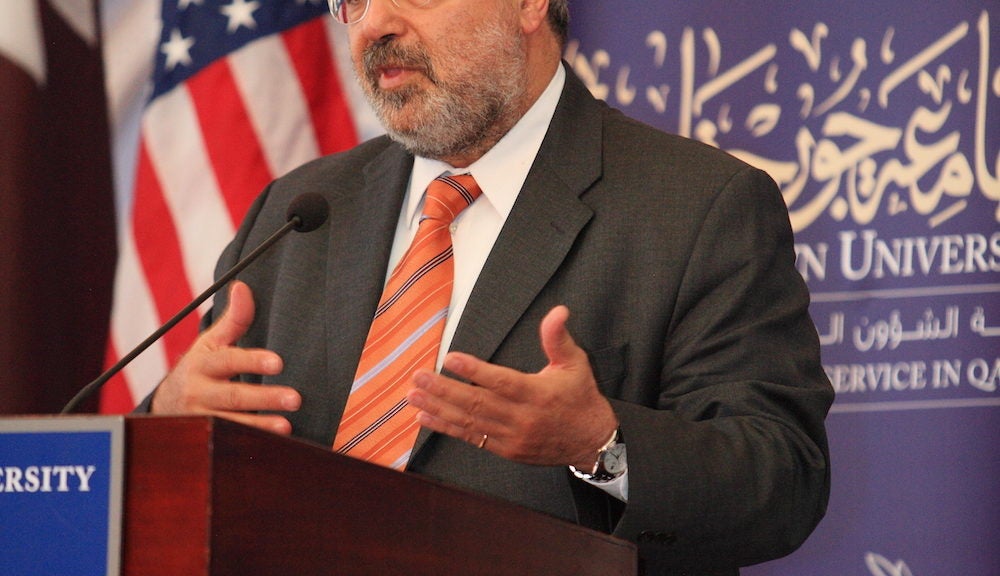Scholar Presents an Arab View of Challenges Facing Next US Administration

On Sunday evening, August 24, 2008, the Center for International and Regional Studies at Georgetown’s Qatar Campus hosted a lecture entitled “America, the Middle East and the Gulf: An Arab view of the challenges facing the next US administration.” The lecture by noted scholar Rami Khouri marked the beginning of the academic year’s Distinguished Lecture Series.
Rami Khouri is the Director of Issam Fares Institute for Public Policy and International Affairs at the American University of Beirut and an editor-at-large of the Daily Star newspaper in Beirut. He is a book author and writes an internationally syndicated weekly column.
In his lecture, Khouri presented an Arab view of what is happening in the region, the challenges facing the people in the Middle East, and the next White House Administration.
According to Khouri, the Middle East region is witnessing a turning point in its history. “This is a moment of potential tremendous change in the Middle East. There are changes in regional relationships among people in the Middle East and in the relationship between the region and the Western World,” he said.
Khouri explained how the end of the Cold War led to the emergence of new dynamics, players, ideologies, and relations in the region after it remained paralyzed for half a century. With the Iranian revolution being the only significant change in the region, the Middle East region was quite stable.
He cited several recent opportunities for change in the Middle East, all of which were badly missed due to what he called “political incompetence” of the principal players in the Middle Eastern region and the Western World. As a result of missing opportunities such as the Madrid Peace Conference, the Oslo Accords and the Camp David Accords coupled with the American response to the 9/11 terror attacks, the Middle East entered a cycle of increasing turbulence, violence and fanaticism, and different kinds of tensions that have made the region unstable.
In addition, since 1967, there have been five major crises that defined the Arab world: lack of stable and secure statehood; unclear and unbalanced citizen-state relationships; lack of basic human needs and sustainable development; a crisis of identity and poor relations with the Non-Arab World.
“In most cases the young people in the Arab World in 1990 were addressing the same unresolved issues that their grandparents faced in 1920,” Khouri said.
These lingering crises have made it difficult for the region to enjoy peace and development.
As a result of the post Cold War dynamics, the Arabs are no longer a part of the regional security power. Instead, the power balance in the Middle East is now in the hands of Turkey, Iran and the US. This vacuum of Arab power has given rise to militant groups which have sought to address the power differential.
In analyzing the US administration’s role in the Middle East, Khouri described the US policy and actions in the region as intrusive. He considers that the US is attempting to recreate the Arab World through changing its values and systems.
Khouri also believes that the US failed in the War of Terror. In handling terrorism, the US and other Western governments misdiagnosed the roots of terrorism, resulting in the emergence of more terrorists.
In discussing America’s relationship with Israel, Khouri claimed that the administration’s overt bias towards Israel has diminished its credibility as a moderator and weakened American diplomatic influence in the region. He also blamed the US and Israel for not dealing with the Arab peace initiative positively.
Concluding his remarks, Khouri had two recommendations to offer some hope for regional stability He urged Arab governments to be accountable towards their people and for the next US administration to better understand the complexity of issues in the Middle East while playing a more active role in the peace process.
Mark Saliba (SFS ’09) said that the issues that Rami Khouri discussed are some of the most crucial topics that the Arabs of the Middle East should address and overcome in order to move forward economically, socially and politically. “We know what the problems are, what we want to know is how to solve them. It is very important for Arab intellectuals like Khouri to speak up against the status quo, in the hope of being positive catalysts in the state-development in the Middle East,” he said.